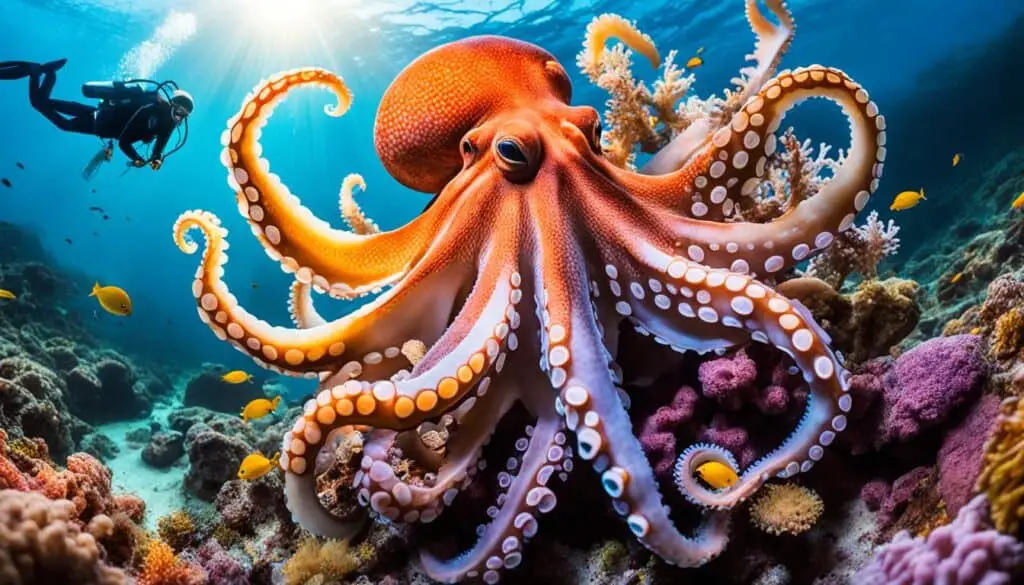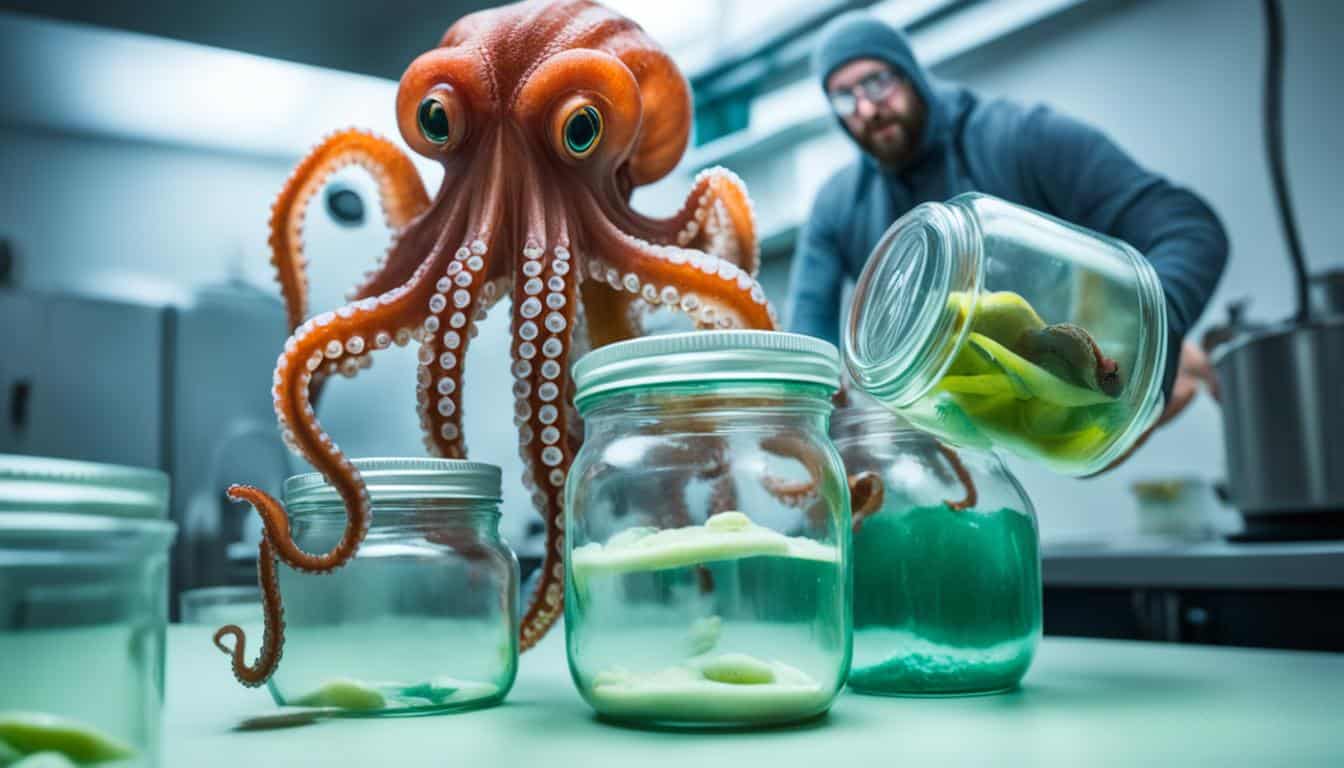The world of cephalopods is fascinating, especially the octopuses. They show off their smartness and skill in escaping. You might ask, can octopuses escape from enclosures? The answer is a big yes! These amazing creatures are not just smart but also want to be free.
Many aquariums have seen octopuses show their cleverness and desire for freedom. Their intelligence and the drive for liberty are truly amazing.
Understanding Octopus Intelligence
Octopuses are amazing creatures that show off their smartness. They have complex brains that help them make smart choices and solve problems. This look into octopus smarts shows how their brains work and what makes them special.
The Complex Brain of Cephalopods
Cephalopods, like octopuses, have some of the most advanced nervous systems. Their brains are very developed, with lots of neurons, many in their arms. This setup lets them handle sensory info and do precise tasks. Experts believe this brain structure is key to their smarts, helping them move through complex spaces and adapt.
Learning and Memory in Octopuses
Studies show octopuses can learn from what they experience. They use what they see and do to build mental maps and remember past events. They can recall where to hide and how to avoid predators. These skills help them survive and adapt, making them stand out as very smart sea creatures.
Can Octopuses Escape from Enclosures?
For years, stories of octopus escapes have amazed marine fans. These tales show how smart these creatures are and make us wonder if they can get out of enclosures. Scientists have seen octopuses do amazing things in captivity.
Notable Escape Stories
Inky, an octopus, made headlines by escaping through a drainpipe in a New Zealand aquarium. Many aquariums have seen octopuses escape, showing how smart they are. These stories prove how clever these animals can be.
The Factors Leading to Successful Escapes
Octopuses can escape for many reasons. They can squeeze through tiny openings thanks to their flexibility. Their curiosity pushes them to check out their world. This mix of smarts and flexibility helps them escape.
Behavior of Octopuses in Captivity
Octopuses in captivity show us how complex they are. They have unique traits that come from wanting to explore and interact. Their actions change a lot, based on their surroundings and the limits of their tanks.
Restlessness and Curiosity as Drivers for Escape
In tanks, octopuses often feel restless and curious, which makes them try to escape. They are smart and love to explore. This urge to explore can make them try to get out of their tanks to find new things.
Life in a tank can be dull, lacking the complex things octopuses find in the wild. Without enough to do, they try to escape. Studies show that adding things like different textures, places to hide, and toys can make them happier and less likely to escape.
| Behavior | Potential Causes | Recommended Solutions |
|---|---|---|
| Restlessness | Monotonous environment | Introduce varied substrates |
| Escape Attempts | Curiosity-driven exploration | Provide interactive enrichment |
| Aggression towards tank walls | Frustration from confinement | Design escape-proof enclosures |
Marine Life: The Natural Habitat of Octopuses
Octopuses live in many different ocean areas, showing how well they adapt. They can be found from colorful coral reefs to the deep ocean floor. These amazing sea creatures have special ways of finding food and moving around that help them survive.
Foraging Patterns and Movement
Octopuses are always on the move to find food. They travel long distances to eat, often avoiding danger along the way. This way, they can hunt for food without being caught by predators.
Their ability to move and hunt shows how important they are in the ocean. It also shows how well they can handle the challenges of their underwater world.
Environmental Stimuli Affecting Behavior
Octopuses react to their surroundings in many ways. Changes in light, water flow, and the presence of threats affect their actions. These things change how active they are, where they hide, and even how they interact with others.
In the ocean, octopuses are always curious about what’s around them. Being trapped is very hard for them because they love to explore.

Common Escape Tactics Used by Octopuses
Octopuses are amazing creatures known for their smart problem-solving and flexibility. They often use clever escape tactics in aquariums. With their unique body and mind, they can move around their surroundings well.
Squeezing Through Small Openings
Octopuses can squeeze through tiny openings thanks to their boneless bodies. They can change shape to fit into small spaces. This skill lets them escape through even the smallest gaps in their tanks.
Using the Tank Environment to Their Advantage
Octopuses are great at using their tank to escape. They climb or move objects to help them get out. By using things in their tank, they can find new ways to escape.
These escapes show how smart and flexible octopuses are. They use their brains and bodies to overcome challenges. Their clever ways of escaping highlight their learning and adaptability in a small space.
Animal Cognition and Octopus Behavior
Exploring octopus behavior shows us their amazing animal cognition. Each octopus has its own personality, which affects how it reacts to things around it. This uniqueness lets them solve complex problems and escape in smart ways, both in the wild and in captivity.
Understanding Their Unique Personalities
Octopuses have complex brains that let them interact with their world in many ways. They can be curious, playful, stressed, or agitated. By studying their personalities, scientists learn more about octopus behavior and how it affects their lives and interactions with humans.
Social Behavior and Solitary Nature
Octopuses usually like to be alone. But sometimes, they can be social, showing behaviors like playing together or interacting briefly. These moments show how smart they are, proving that even alone, they can connect with others in special ways.
FAQ
Can octopuses escape from enclosures?
Yes, octopuses can escape from enclosures because they are very flexible, smart, and good at solving problems. Many aquariums have seen octopuses find small openings or change their tanks to get free.
What intelligence do octopuses possess?
Octopuses are very smart. They can solve complex problems, remember things, and learn from their experiences. Their brains are among the most complex in the animal world, helping them understand their surroundings.
How do octopuses behave in captivity?
In tanks, octopuses often act out of curiosity and boredom. They like to explore and interact with their tank, which can lead them to try to escape. Aquariums might not give them enough to do.
What are some notable escape stories involving octopuses?
One well-known story is about Inky, an octopus from New Zealand, who escaped through a drainpipe. Many aquariums have seen octopuses use their smarts to get out, showing how clever they are.
What factors contribute to successful escapes by octopuses?
Octopuses escape because they are curious, smart, and flexible. They can fit through small spaces and move around well, helping them escape.
What are the foraging patterns of octopuses in the wild?
Octopuses move a lot to find food. They go through different water areas to survive and adapt over time.
How does the environment affect octopus behavior?
Things like light and water movement affect octopus behavior. A changing ocean makes them more curious, making it hard for them to stay in tanks.
What escape tactics do octopuses commonly use?
Octopuses can fit through tiny openings because they don’t have bones. They use smart tricks like climbing or changing things in their tanks to escape.
Do octopuses have unique personalities?
Yes, octopuses have their own unique behaviors and traits. Researchers have found that each octopus has its own personality, which affects how it interacts with its surroundings and solves problems.
Can octopuses engage in social behaviors?
Octopuses usually live alone, but sometimes they can act socially under certain conditions. Their smart minds help shape how they interact, whether in tanks or in the wild.







